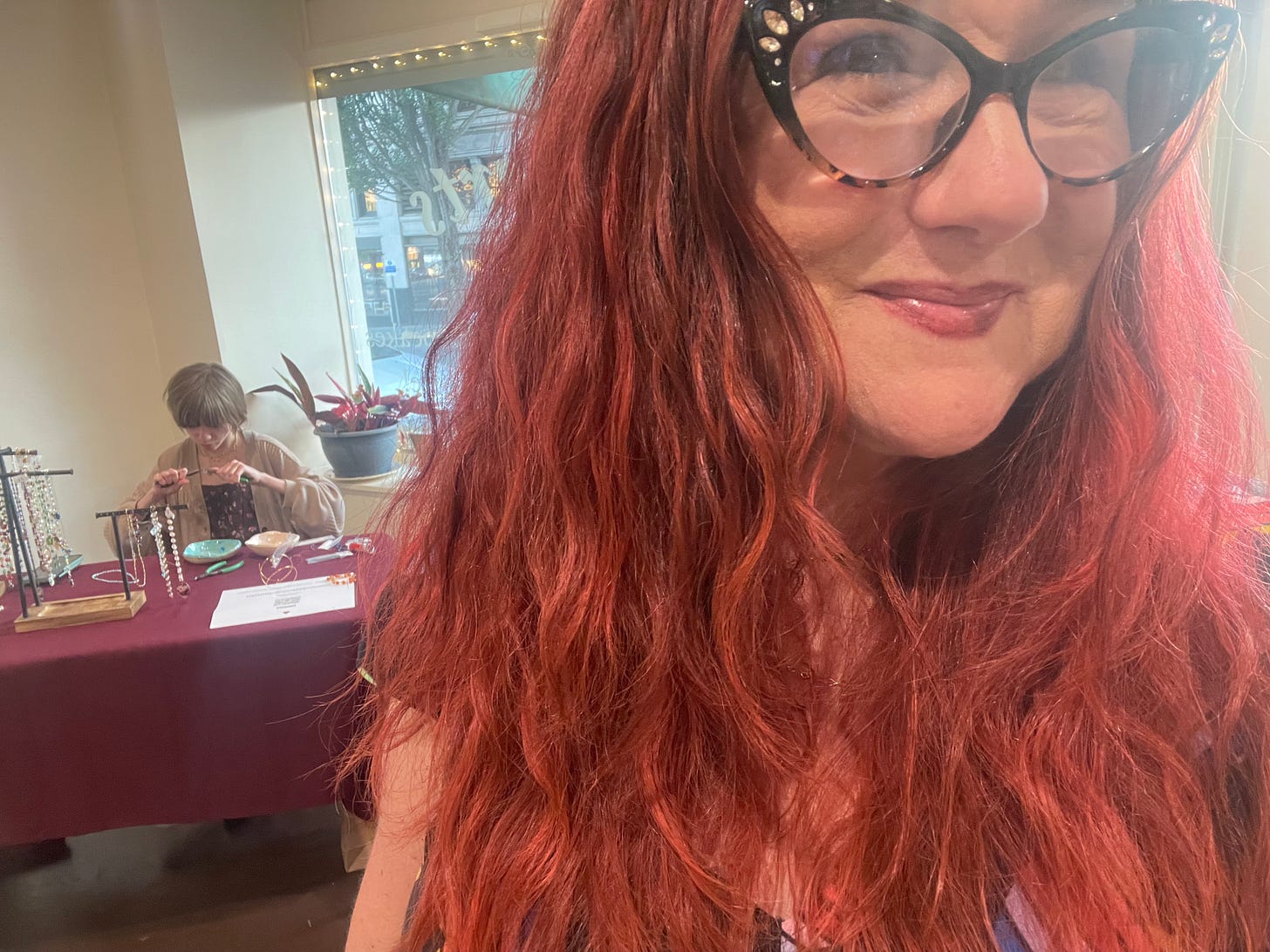Peri Is the New Menopause
Why GenX women are happy to chat perimenopause — but still avoid the “M” word
Peri: not our mother’s menopause
As I approach menopause, I’ve never been more grateful to be GenX.
I see GenX women showing up to destigmatize menopause. I see an emerging willingness in my GenX peers to openly discuss their symptoms and experiences that I find heartening — and educational. I only know about Estradiol because a friend spoke up on social media. That patch has been an absolute game-changer for my brain fog.
But you know what I don’t hear much? The actual word menopause.
Among GenX women, I hear perimenopause.
And I don’t think it’s a coincidence or a misnomer. We all know where we are in terms of our cycles ending. We know 12 months of no periods means we’re all done.
But I don’t think that matters in this case.
Peri is, effectively, a rebranding of menopause.
GenX women don’t want our mother’s menopause. Which, let’s face it, we don’t actually know much about because no one ever talked about it.
We want to talk about it. But we want to do it both on and with our own terms.
Perimenopause vs. menopause: what’s the difference?
First, let’s talk definitions. According to the Mayo Clinic:
Perimenopause means ‘around menopause’ and refers to the time during which your body makes the natural transition to menopause, marking the end of the reproductive years.
Menopause is the time that marks the end of your menstrual cycles. It’s diagnosed after you’ve gone 12 months without a menstrual period.
Mayo doesn’t define post-menopause, but the NIH does, as defined below:
Post-menopause is the time after menopause, when a woman hasn’t experienced a period for over a year.
So, they’re sequential. But also, confusing? If perimenopause is the time frame up till 12 months without a period, and post-menopause is the time after that same window — then when exactly are we in menopause?
Is menopause a single-day event — right at the 12-month moment — and everything is peri or post?
This is too big a question for my foggy brain to tackle today. But it does seem this ambiguity gave GenX women an opportunity to claim the term “perimenopause” to define the years that were previously just called menopause. And we took it.
Hey, if Millennials can define 105 genders (and counting), then GenX is entitled to one new term for our meno, right…?
Given that GenX women were born between 1965–1980, and that the average age of menopause is 51, many of us remain clearly in perimenopause. That’s just math.
But the other half of us, we’ve already hit our 12-month milestone, or are about to. And yet still… we still say perimenopause.
I have a few thoughts on why.
The weightiness of the word menopause
It’s hard to remove the connotations from the word menopause. It’s a deadline we’ve all always known was looming, like an ominous ending not just of our reproductive potential, but also our sexuality, our vitality, our professional relevancy, and our cultural relevance.
At least, that’s what I always feared, when I allowed myself to consider it. Which I never really did, until it made itself obvious and unignorable.
I suspect many of my GenX peers feel the same way.
Menopause seems weighty. It sounds resigned, inevitable, unspoken, grey. Done.
It’s hard to embrace all that.
Even phonemically, menopause is an ugly word. The syllables pull your mouth downward, and that final “awww” syllable just sounds off-putting, like a dismissive eye-roll from an indifferent younger generation who no longer finds you relevant.
Also, menopause leads with ‘men.’ Why oh why would we want to lead with men when talking about this uniquely femme transition?
Men. They’re always encroaching in our space and now they’re here for both our moments of reproductive transition, from menstruation to menopause? Who the hell named these products?? Did they do any focus groups?
I bet it was a panel of all white men.
I can hear these men. “Let’s call it menopause because the men are gonna pause before getting with those women, heh heh,” they probably snickered.
You know no woman would have given the green light to lead with ‘men.’
The unbearable lightness of peri
I never heard about perimenopause until the media lit up with articles about it a few years ago. By then, I was already in it.
I was delighted to have an explanation for my symptoms that clearly weren’t yet menopause (too many periods for that). Ahhh yes, it’s just perimenopause. Something about the term felt light and relatable.
Perimenopause sounds curious, expectant, perky even. You’re not quite there yet. And when you do get there, you’ve got options.
You’ve still got time. It’s just peri.
Sure, the symptoms of perimenopause aren’t fun. But — and this part is trickier to explain — to my GenX ears, they don’t come with the same cultural baggage as menopause.
Like, perimenopause can still fit into her cute jeans. She has a twinkle in her eye alongside the wrinkles (which just give character). Peri most definitely still has her shit together; she can still run a team meeting, a household, and/or a happy hour with ease.
If she’s single, she dates, ‘cause she’s still got it. And by ‘it’ I mean, still has a functioning vagina and sex drive.
Sure, perimenopause gets hot flashes and brain fog, and other hormonal inconveniences, but that’s what they are — inconveniences. They don’t debilitate us, and they don’t define us.
It’s empowering. With perimenopause, it feels like we have a process to manage versus a fate to face. And that’s a lot easier to manage — and talk about.
Now we have the GenX peri-movement
I’m not blaming the generation of menopausal women before me in any way. For nearly 20 years they were denied HRT on the basis of a now-debunked study.
They were told they had no treatment options.
They were told their symptoms weren’t real, to deal with them — as so often happens to women.
They also didn’t have access to social media and other online resources to share their experience, do their own research, and find community. I can only imagine how isolating it must have felt.
I’m grateful to be coming of age during the GenX peri-movement. (May I coin this term? I believe I just did.)
The peri-movement has three primary pillars — the ability to:
Define our end-of-fertility experience on our own terms.
Share our experiences and information online.
Access HRT and other treatments that work for our individual needs.
We have more knowledge, more options. If we’re lucky, we have doctors who listen to us, believe us, and most importantly, who treat us.
And most importantly. we have each other.
My own commitment to perimenopause awareness
As a GenX woman on the brink of that menopause moment, I’m determined to share my experiences. I’d like to do my small part to destigmatize the process, to commiserate with my peers, and in the process, pave the way for future generations of women in my wake.
As I mentioned at the start of this article, I only learned about Estradiol because a friend wrote about it on social media. And it has been A. Complete. Game. Changer.
But mostly, I’ve kept quiet about it.
Until last week, when I published a retort to the New York Times article about the cost of menopause called called Getting Hired as a Woman Over 40 Just Got Even Harder.
I shared the article with friends on Facebook without hesitation. But I paused before posting it to LinkedIn. Could I share this article with my entire professional network? After all, it has the “M” word in it.
It also has the word “workplace” in it. Of course, it was relevant, I told myself. So I took a breath and clicked “post.’
The response was overwhelmingly positive and went a bit viral. I’ve had several women reach out to me directly with questions, or to express thanks. One shared her recent experience with fibroids. Another expressed relief to hear someone else had symptoms just like hers. Another told me she’s scared of the unknown ahead of her.
My takeaway? It’s on GenX to lead the way.
I know that’s not traditionally our strong suit.
Millennials — the larger, rowdier cohort that they are — have opened doors for so many previously not-talked-about topics that we never took on. Racism, sexuality, gender, fatphobia, size inclusivity, mental health, trauma, late-stage capitalism: the list of what they’ve collectively tackled is massive, and has truly shifted the way our world works.
GenX is just… well, we’re not that all that. Whatever.
But we GenX women have an opportunity — nay, I’d go so far as to say, an obligation — to tackle ageism, by normalizing the experience of menopause.
I mean, perimenopause.
Or just peri.
I don’t care what we call it.
We just need to talk about it.
Peri is the new menopause. Now go spread the word.
Greetings!
I’m Dana DuBois, a GenX word nerd living in the Pacific Northwest with a whole lot of little words to share. I’m a founder and editor of two Substack publications: Pink Hair & Pronouns and genXy. I write across a variety of topics but parenting, music and pop culture, relationships, and feminism are my favorites. Em-dashes, Oxford commas, and well-placed semi-colons make my heart happy.
If this story resonated with you, why not buy me a coffee?
(Make mine an iced oat milk decaf mocha, please and thank you.)




